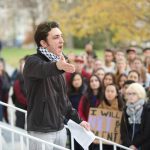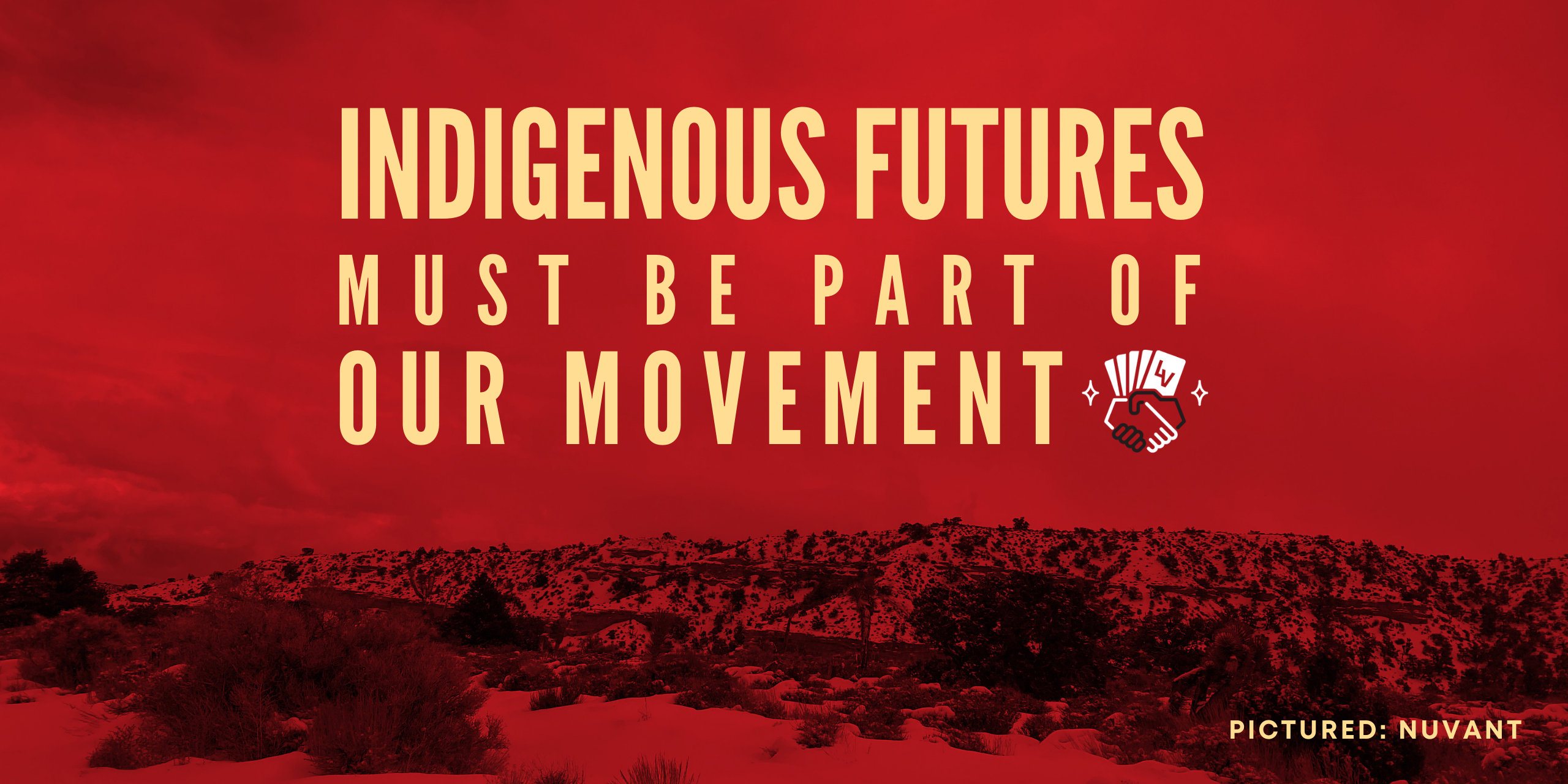Indigenous Futures Must Be Part of Our Movement

In October 2020, Illuminative, the Native Organizers Alliance, and the Center for Native American Youth released the Indigenous Futures Survey (IFS). The survey, billed as “the largest and most comprehensive study ever conducted in Indian Country, aimed at providing a platform for Indigenous perspectives on social and political issues. As per the collective in the survey’s introduction, “the purpose of the Indigenous Futures Survey is to learn from Indigenous Peoples — how we think about ourselves, what we find important, and what galvanizes us to make change.”
The Indigenous Futures Survey is an indispensable document for any movement dedicated to democratic socialism on occupied lands. Its findings illuminate the path forward in the movement against all forms of oppression. There are three highlights DSA organizers in Nevada should heed from the IFS: important issues, voter suppression, and political identity among Indigenous people.
Firstly, the IFS found the two most urgent community priorities for Indigenous people in Nevada were improving mental health and care for tribal elders. While many Nevadans already experience abysmal healthcare, making the fight for Medicare For All perpetually urgent, the healthcare crisis disproportionately impacts Indigenous people.
A quarter of all respondents to the IFS said they felt depressed and more than half reported higher stress levels. COVID-19 has ravaged through Indian Country: 51% of Indigenous people with COVID symptoms could not access testing; 15% of Indigenous people did not have adequate access to Personal Protective Equipment (PPE); and 11% of Indigenous people knew someone in their immediate circle who passed away due to COVID-19, as of August 2020. Majorities of all Indigenous political identities listed mental health as a top community concern. COVID-19 makes it worse; now, the crisis is a community epidemic.
Given COVID-19’s deadliness to older residents, the pandemic makes the need to care for tribal elders even more acute. All lives are valuable and each loss a tremendous wound for their family, community, and our wider humanity. Further, the tragic losses of tribal elders means cultural erasure. Not only will many Paiute, Shoshone, and Washoe individuals lose family members and close ones, but on reservations like the Moapa River Indian Reservation, tribal elders are treasured keepers of the Southern Paiute language. The deaths of elders will lead to erasure of cultural heritage and entrenchment of the capitalist-settler state in Nevada.
The second finding that concerns democratic socialists is the severe voter suppression Indigenous people face in Nevada. Many had to drive up to 100 miles away to cast their ballots in November. That’s the “tyranny of distance” described by the Native American Rights Fund. Organizations, such as the Nevada Statewide Native American Democratic Caucus and Nevada Native Vote Project, fought to guarantee greater polling locations on reservations. Yet massive distances remained and the lack of access to polling locations was the largest voting concern cited in the IFS by Indigenous people in Nevada.
The fact that polling location accessibility was such a concern is unconscionable. If we want to guarantee all people who face marginalization at the ballot box the capacity to vote — to influence a system that was built at their exclusion — we must strive to pressure Nevada to work with sovereign nations and Native advocacy groups to protect the franchise. This requires not only relentless pressure to fight voter suppression under Indigenous leadership, but also a campaign to ensure the Secretary of State who oversees elections prioritizes ending voter suppression in Indian Country.
Finally, the third most important takeaway for democratic socialists is the relationship between Indigenous people and democratic socialism itself. According to the IFS, there are more Indigenous democratic socialists than Republicans. In fact, democratic socialists make up the third-largest political bloc in Indian Country. However, in Nevada, the number and proportion is lower. Only 3% of Indigenous Nevadans describe themselves as democratic socialists. That illustrates the fierce urgency that we must confront in forming alliances with Indigenous people — not on settler terms, but on Indigenous terms.
We have not done nearly enough to form those alliances thus far. That is especially evident in the wake of the attempted fascist coup in the nation’s capital. Our local responsibility to form alliances with Indigenous advocates is deeply related to the political culture of Nevada and particularly the authoritarian Right.
As Carl Segerstrom wrote at High Country News, “the Western U.S. isn’t the only place where anti-government sentiment festers, but here the wounds are open, frequently endured and historically recent. Violence and the threat of violence in the region occur within the context of a nation founded on the genocide of Indigenous people. Leaders of anti-federal movements lean into this violent history and include factions that are specifically anti-Indigenous. In defending his right to graze cattle on federal land in Nevada — a claim he successfully defended at Bunkerville in 2014, when federal authorities withdrew after being outgunned by militiamen — Bundy argued that his claim to the land was more legitimate than the Southern Paiutes’ because “they lost the war.”
This Nevadan fascism, now on the national stage in the form of authoritarian coups, is also deeply complicit in poverty and food insecurity among Indigenous people during the current pandemic. The fascist ideology enables the lack of respect many settler Nevadans have for Nevadan lands and the stewardship of the lands by its Indigenous people. Even as food shortages shot up among the Walker River Paiute, settlers invaded tribal land and stole 30 cases of water supply on the doorstep of the Yerington Paiute sovereign nation’s community center. Yerington Paiute has relied on bottled water because its groundwater is poisoned with uranium and arsenic from the old Anaconda Copper Mine that razed Paiute land on the orders of the Gilded Age capitalists of the twentieth century. In short, the need of capital to destroy Paiute land made it so the only way to survive was bottled water, which was then stolen by settlers who benefited from the capital that razed the land.
Indigenous needs have to be prioritized and centered in our organizing as socialists committed to creating a better country and a better world; the bedrock of democratic socialism in the West must be Indigenous sovereignty. We must heed the findings of the Indigenous Futures Survey and include the needs of Nevada’s original people in our organizing for mental health care and pandemic relief. We must look to the leadership of Indigenous advocates in confronting voter suppression within state boundaries and beyond. We welcome Indigenous organizers, to learn from one another, and to fight for this better world we seek together.

